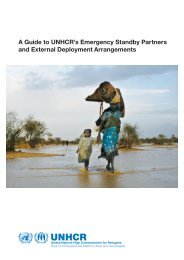FLOODS IN NWFP PAKISTAN – 17 August 2009 - OneResponse
FLOODS IN NWFP PAKISTAN – 17 August 2009 - OneResponse
FLOODS IN NWFP PAKISTAN – 17 August 2009 - OneResponse
Create successful ePaper yourself
Turn your PDF publications into a flip-book with our unique Google optimized e-Paper software.
<strong>FLOODS</strong> <strong>IN</strong> <strong>NWFP</strong> <strong>PAKISTAN</strong> <strong>–</strong> <strong>17</strong> <strong>August</strong> <strong>2009</strong><br />
This situation report is based on information<br />
received from UN Agencies, humanitarian<br />
partners, government sources and the media.<br />
SITUATION OVERVIEW<br />
Heavy rainfall on 16 <strong>August</strong> caused flash floods<br />
originating from the Karamar Mountains in<br />
Swabi and Mardan Districts in North West<br />
Frontier Province (<strong>NWFP</strong>), Pakistan. The<br />
numbers of affected people remain<br />
undetermined. According to various sources,<br />
there are reports of 27 deaths, nine people<br />
missing, an estimated 400-450 houses<br />
destroyed along with massive losses to crops<br />
and livestock.<br />
The most affected Union Councils were Ismaila,<br />
Kalu Khan and Adina in Swabi District and<br />
Shahbaz Garrhi and Garryala in Mardan District.<br />
The District Administration in Swabi has<br />
declared a state of emergency in Adina, Ismalia<br />
and Kalu Khan.<br />
The Swabi District Coordination Officer (DCO)<br />
reported that about 70,000 to 80,000 people<br />
have been affected in the region. The UN<br />
assessment team reported that approximately<br />
100 houses have been damaged in Kalu Khan in<br />
Swabi District.<br />
As the water swept through the villages, the<br />
roofs of mud houses collapsed and caused the<br />
majority of the deaths. Concrete houses were<br />
mostly unaffected. The flood waters submerged<br />
the cultivated land in these regions and much of<br />
maize, rice, sugarcane and tobacco crops were<br />
destroyed. Livestock was washed away and<br />
drowned. In addition, valuables in homes were<br />
completely swept away and stored grains in<br />
houses were destroyed.<br />
Traffic between Swabi and Mardan, Mardan-<br />
Rustam, Mardan-Shahbaz Garhi and Mardan-<br />
Dubian was totally cut off. Several bridges were<br />
washed away while the communications network<br />
has been severely damaged in Mardan District.<br />
An initial assessment has been completed by<br />
non-government organization Muslim Aid, the<br />
first on the scene, and the United Nations<br />
currently has an assessment team in the regions.<br />
Mardan and Swabi Districts are adjacent to each<br />
other and are the districts with the largest<br />
number of people displaced due to military<br />
operations in Malakand Division. Swabi District<br />
hosted internally displaced people (IDPs) from<br />
Buner District while Mardan District received<br />
IDPs from Swat District.<br />
NEEDS<br />
The normal practice in these agricultural regions<br />
is for most of the farmers to store six months of<br />
wheat or dry rations in their homes. These<br />
rations have now been swept away by the floods,<br />
which may lead to food insecurity. Should food<br />
be necessary, a WFP hub is located just a few<br />
kilometers away.<br />
There is also a requirement for medicine, tents,<br />
drinking water and aqua tabs. The large<br />
number of livestock lost to the flood waters also<br />
means a loss of livelihoods to many households.<br />
RESPONSE<br />
Government, UN agencies and other<br />
humanitarian organizations have started relief<br />
activities in the flood affected areas of Mardan<br />
and Swabi Districts. The Government’s<br />
Emergency Response Unit arranged boats from<br />
the Pakistan Army that were dispatched to<br />
Mardan District while two trucks with tents and<br />
non-food items (NFIs) are also due to reach<br />
Mardan District for emergency shelter.<br />
UNHCR is sending NFIs and 500 tents for<br />
distribution in flood affected areas in Swabi<br />
through the DCO. WHO has set up three<br />
medical camps in Mardan and has assessed<br />
that there is sufficient anti-venom for potential<br />
snake bites after the flood waters recede.<br />
UNHABITAT has pre-positioned plastic sheets<br />
and tents should they be needed in Mardan
District, while IOM has flood relief related NFIs<br />
ready to be delivered in flood affected areas.<br />
Muslim Aid has also started providing relief<br />
items such as kitchen sets, jerry cans, water<br />
buckets, mattresses and tents to flood affected<br />
communities in Shahbaz Garhi in Mardan<br />
District.<br />
For more detailed and updated information<br />
please visit the Pakistan website at<br />
www.un.org.pk or contact:<br />
OCHA Office in Islamabad<br />
Manuel Bessler, OCHA Head of Office Pakistan<br />
bessler@un.org<br />
Stephanie Bunker, Spokesperson<br />
bunker@un.org Cell: 0300 850 2397<br />
Flood Affected Union Councils in North West Frontier Province (<strong>NWFP</strong>)











